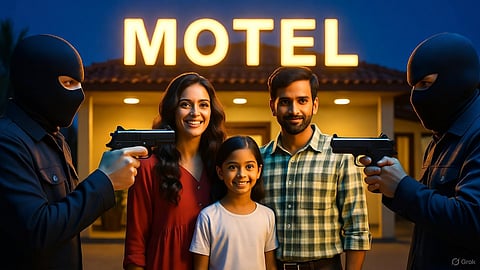
- Home
- NewsGram USA
- India
- न्यूजग्राम
- World
- Politics
- Opinion
- Entertainment
- On Ground
- Culture
- Lifestyle
- Economy
- Sports
- Sp. Coverage
- Misc.
- NewsGram Exclusive
- Jobs / Internships
- Interview

The Gujarati diaspora has long dominated US motel and gas-station businesses.
There has been a recent trend of violence against Gujarati motel owners in the US.
This has to do with nature of the business, which come with several isks, as well as growing racist and anti-immigration sentiments.
For decades, the Gujarati community, particularly Patels, has been synonymous with America’s motel and gas-station business. From small highway inns to bustling convenience stores, their story has long stood for grit, thrift, and ambition. But this year, a darker pattern has emerged: a series of killings that reveal how vulnerable these family-run businesses can be in small-town America.
Since January, at least seven Gujaratis who owned or managed motels in the United States have been killed. The most recent death was reported on 6 October 2025, near Pittsburgh, Pennsylvania, where 50-year-old Rakesh Patel from Surat was shot point-blank while managing a motel he co-owned. Days earlier, on 2 October 2025, Anil Patel and Pankaj Patel were gunned down at their North Carolina motel. In March, a Gujarati woman and her father were shot dead during a robbery attempt at their convenience store in South Carolina.
In September 2025, a particularly gruesome killing underlined the danger.
Chandra Mouli “Bob” Nagamallaiah was an Andhra native who managed a Gujarati-owned motel in Dallas, Texas. Having spent most of his life in Bangalore, Bob shifted to the US with his family in 2018, where he dreamt of running a hospitality business with his sister and brother-in-law. His friends described him as gentle, humble, and hardworking.
On 10 September 2025, Bob got into an argument with a co-worker over a broken washing machine. The dispute escalated. The co-worker, Yordanis Cobos-Martinez, pulled out a machete and attacked Bob in front of his wife and son. A video of the incident shows Martines hacking at Bob repeatedly before stealing his phone and key cards. He continued till Bob was beheaded. CCTV footage showed him kicking the severed head along the road before throwing it in a dumpster.
The Gujarati hold over America’s motel industry is enormous. Though they make up just 1% of the U.S. population, they control more than 60% of all motels, according to filmmaker Amar Shah, whose documentary The Patel Motel Story premiered at the Tribeca Festival. Shah’s film traces how generations of Gujaratis turned modest roadside motels into a $52-billion empire.
The story began in the 1930s, with Kanji Manchhu Desai. Desai was an illegal immigrant who had made his way into the States through Trinidad in 1934. He was the first Patel hotel owner in the US. He leased hotels in California and mentored other Gujaratis to do the same. His advice, “If you’re a Patel, lease a hotel,” became a community mantra. During World War II, Desai looked after a Sacramento hotel whose Japanese-American owner had been sent to an internment camp, marking one of the earliest Gujarati forays into American hospitality.
By the 1950s and 1960s, new immigrants followed Desai’s example. Relatives pooled savings, offered handshake loans, and bought cheap properties. Repayments were often replaced by the promise to fund the next relative’s purchase.
Their success was rooted in community networks and family labour. From the 1960s onwards, families would lease a run-down motel, live in one or two rooms, and run the front desk themselves. Profits from one property were rolled into buying the next—a model described by economist-entrepreneurs as “dhandho capitalism.”
Known for their business and capital networks, Gujaratis made use of registered forums in the US to promulgate their strategies amongst the Gujarati diaspora. Associations like the Asian American Hotel Owners Association (AAHOA)—which represents over 20,000 members owning some 33,000 properties—is dominated by Gujaratis.
By the 1990s, Patels owned half of all U.S. motels. The New York Times famously dubbed it the “Patel Motel Cartel” in 1999.
Success, however, has come with a cost. Motels and gas stations in isolated areas draw a disproportionate number of police calls, according to a 2021 USA Today investigation. Many of these establishments are located in remote or low-income areas, often along highways or on the edges of American towns, where crime rates run high.The nature of these businesses—the steady cash flow, transient clientele, and round-the-clock hours— also make them vulnerable to crime. Drug deals, prostitution, unpaid-lodger disputes, and robberies are common, often turning deadly, and the risks are borne directly by families running the establishments.
Owners, many of whom live with their families inside the properties, face constant exposure to these threats. Social-media posts by motel workers and guests have highlighted basic security gaps—faulty locks, missing cameras, and understaffing—issues often linked to cost-cutting in budget motels.
Beyond everyday crime, there is a sharper edge of racial hostility. Community leaders say anti-Indian sentiment in smaller American towns has grown in recent years. Gujaratis’ economic visibility has made them targets for hate crimes and vandalism, particularly during political climates hostile to immigrants. Civil-rights groups have recorded spikes in assaults and harassment against Indian and South-Asian owners since the “Make America Great Again” era began in 2016. The uptick in crimes against Gujaratis this year also coincides with President Trump’s hardening anti-immigration stance. [Rh/Eth/DS]
